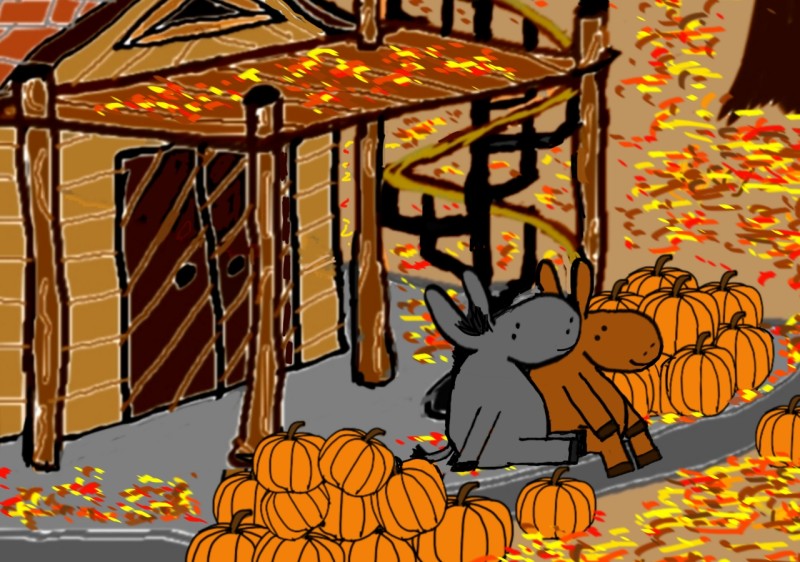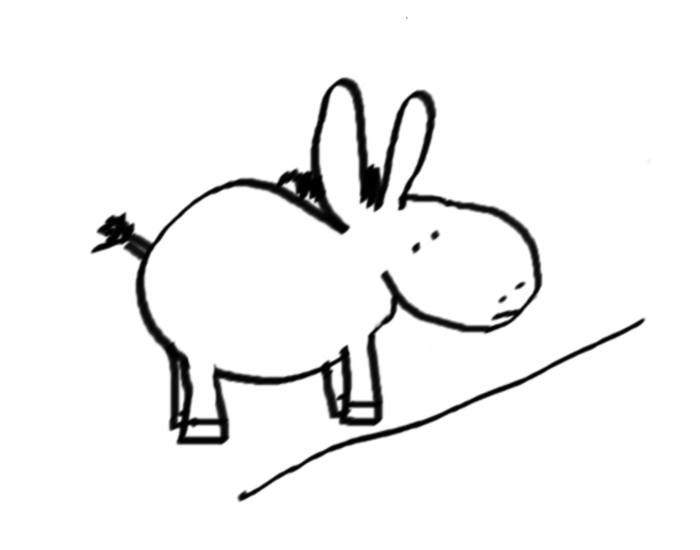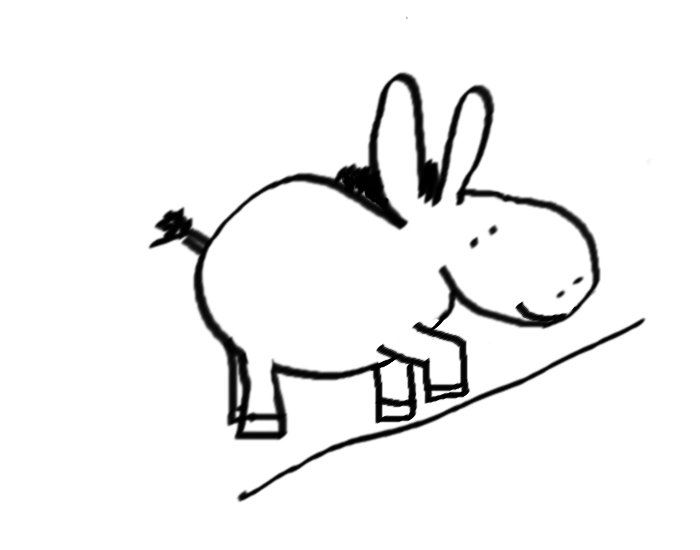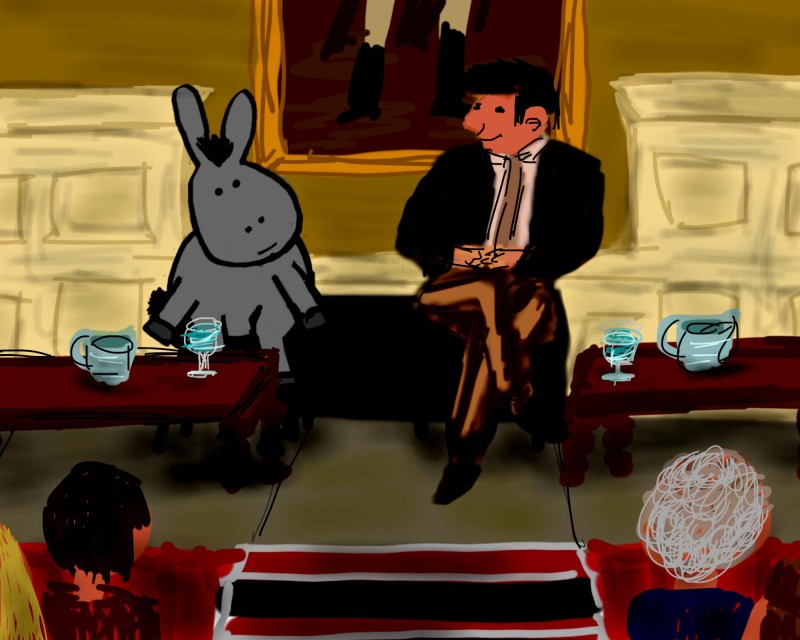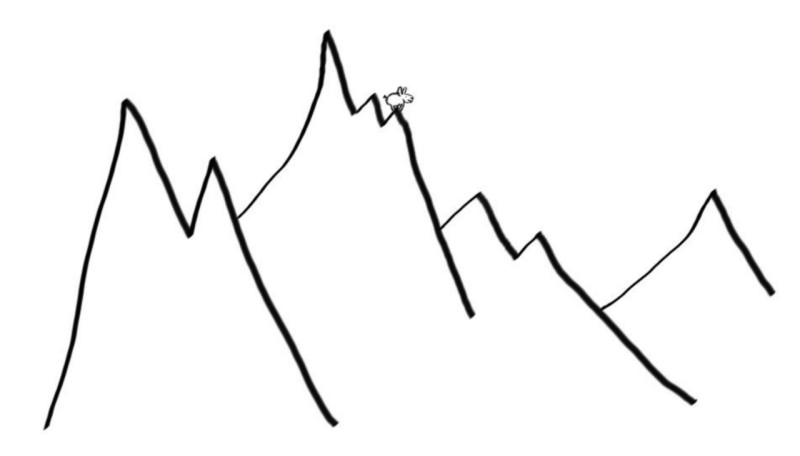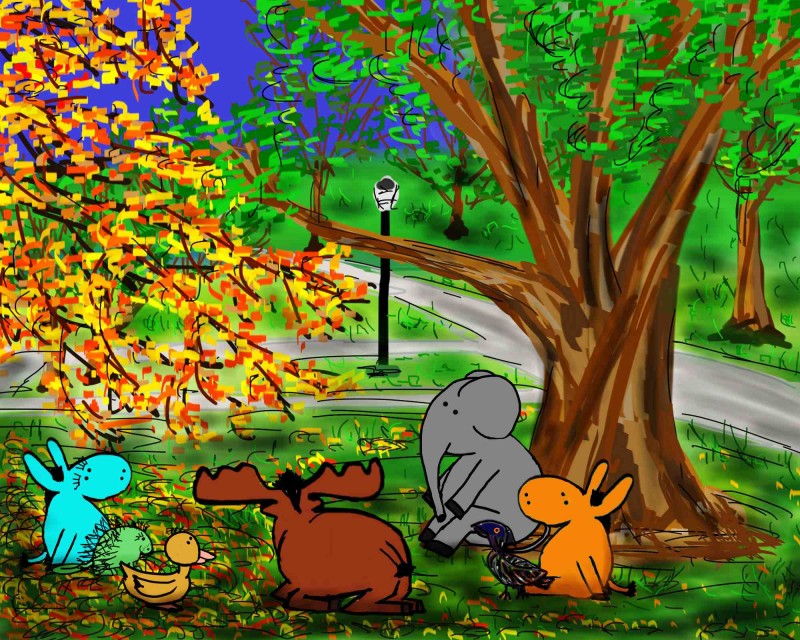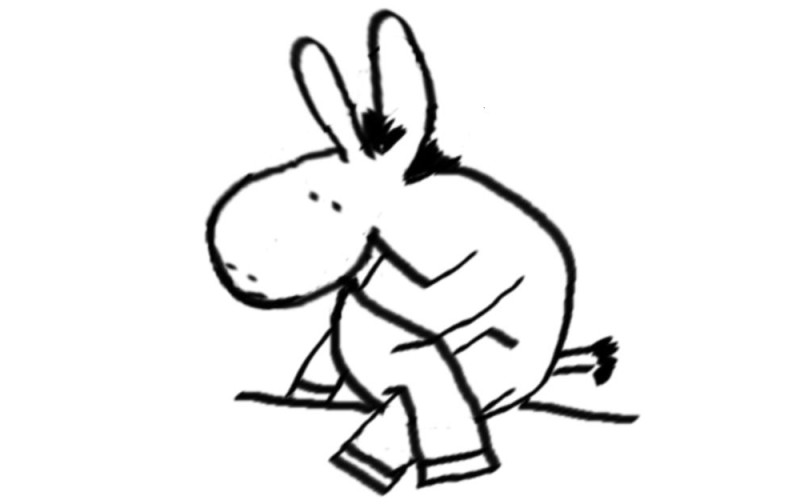Where are the others? said Pablo. They’re inside, said Blurtso, sleeping off the pumpkin pie. Yes, said Pablo, not many animals have the constitution of a donkey. That’s for sure, said Blurtso. How’s life in Cambridge? said Pablo. Fine, said Blurtso, I saw an amazing jenny three weeks ago. Really? said Pablo, What’s her name? I don’t know, said Blurtso, I think it’s Lizzy. You think? said Pablo. Yes, said Blurtso, I’ve never spoken with her. Why not? said Pablo. Because I don’t know what to say, said Blurtso. Why can’t you say whatever comes to mind, said Pablo, and just be yourself? Because I want her to like me, said Blurtso, and she might not like me for myself. Why would you want to be with her, said Pablo, if she didn’t like you for yourself? Because she’s incredible, said Blurtso. That doesn’t make sense, said Pablo. No, said Blurtso, I suppose it doesn’t, but maybe I could convince her to like me. That would be the worst thing to do, said Pablo, because then you’d have to spend your life continuing to convince her, and you’d never be yourself. Perhaps, said Blurtso, but at least I’d be with her. Maybe not, said Pablo, she might eventually realize you’re a fake. Yes, said Blurtso, you may be right. So, said Pablo, what do you think you’ll do? I’m not sure, said Blurtso, I think I’ll do everything I can to convince her to like me. Yes, said Pablo, I thought so.
Tag: letting go
“Blurtso crosses the line”
That’s far enough, said Blurtso, drawing a line on the ground with the edge of his hoof. The sand was dry and sun-baked and he had to scrape the surface several times before the mark was visible. That’s far enough, he repeated, and the others remained on their side of the line. Blurtso remained on his side as well, looking up at the others then looking down at the ground. The sun that had baked the ground was hot and began to bake Blurtso and continued to bake the ground. One by one the others walked away. Then there was only Blurtso, the sun, and the ground…
Ooops, said Blurtso, as he let his hoof slip across the line he had drawn in the sand. Ooops, he said, as another hoof crossed, followed by his haunches, his rump, and his stumpy little tail. Ooops, he said, turning and sweeping the line with his boxing-glove nose, then stamping and stomping and tromping until there was no mark left at all. Very good, thought Blurtso, as he surveyed his work and considered his new-found freedom. Freedom? he thought, looking in the direction where the others had gone. Wait for me! he cried, scampering off to join them.
“Blurtso stands in the snow” (V)
Welcome to tonight’s discussion sponsored by “The Campus Institute of Political Seriousness for Enhanced Living in an Unenhanced World.” I’m your host, Jonathan Wellborn Truington III, and joining us this evening is Mr. Blurtso Lundif, a third-year diversity fellow at Harvard College, who has garnered attention in Cambridge as, “the donkey who stands in the snow.” Please tell us, Mr. Lundif, if you would, what is your opinion of the current political climate in our nation’s capital? The political climate? said Blurtso. Yes, said Mr. Truington. I don’t know anything about it, said Blurtso. Do you think, said Mr. Truington, that the politicians should all go stand in the snow? It couldn’t hurt, said Blurtso. And what have you accomplished, said Mr. Truington, by standing in the snow? Accomplished? said Blurtso. Yes, said Mr. Truington, what have you learned? I’ve learned to stand still, said Blurtso. To stand still? said Mr. Truington. Yes, said Blurtso. Anything else? said Mr. Truington. Isn’t that enough? said Blurtso. Well, said Mr. Truington, I suppose it is… and where exactly do you stand? Anywhere, said Blurtso. Anywhere? said Mr. Truington. Yes, said Blurtso, anywhere that’s snowy and cold. Is there something, said Mr. Truington, that inspires you to do it? Yes, said Blurtso, it’s compelling to stand in a public place that is empty… and where, if someone does appear, they move so quickly they may as well not be there. I see! said Mr. Truington, standing in the snow is an indictment of the modern world and its frenetic pace! Is it? said Blurtso. Does it bother you, said Mr. Truington, if others stand in the snow next to you? No, said Blurtso, as long as they don’t ask questions. Questions? said Mr. Truington. Yes, said Blurtso, about why I’m standing in the snow. Of course, said Mr. Truington, and apart from your scathing attack on people in a hurry, what other statements are you trying to make? Are you attempting to draw attention to a charitable cause? Are you trying to see how long you can stand before collapsing? No, said Blurtso, I go home whenever I want. And how do you know, said Mr. Truington, that it’s time to go home? As soon as I start walking, said Blurtso, I know it’s time to go. Remarkable, said Mr. Truington. Well, ladies and gentlemen, there you have it, neither ice, nor sleet, nor snow will stop this remarkable coed from making his stand. Please join us next week when our featured speaker will be Somerville’s own self-deprecating playwright and hairbrush salesman, Reverend Willy J. Loman.
“Blurtso lets go”
Here I go! said Blurtso, looking down at what lay below him. Here I go! he said again, still looking at all the things that lay below. Blurtso’s boney little hooves clung tightly to the rocky spine on which he stood, and his pin-point eyes were bright and full of frenzy. Here I go! he said a little more quietly, and with much less conviction. Here I go! Here I go! Here I go! he repeated, and clung even more tightly to the spine that began to cut into his hooves and make them bleed. Here I go! he said more loudly, but with no conviction at all. Here… I… and off he went, slipping, sliding, and tumbling into the only future that awaited him.
“Weohryant University” (XIX) – Where 101
Today’s question, said Harlan, is: “Where did it go?”
Where did what go? said Chelsea.
It was here just a minute ago, said Morton.
I didn’t take it, said Emma Lou.
Neither did I, said Frank.
Do you mean “ubi sunt”? said Glouster.
Ubi sunt? said Morton.
“Ubi sunt,” said Glouster, is Latin for “Where are they?” It comes from a Latin poem that begins, “Ubi sunt qui ante nos in mundo fuere?” which translates: “Where are they who, before us, existed in the world?” It was a common theme in medieval poetry, and was most famously expressed by the French poet, François Villon who asked, “Où sont les neiges d’antan?” or “Where are the snows of yesteryear?”
The snows of yesteryear? said Morton.
I don’t like snow, said Chelsea.
Neither do I, said Frank.
I don’t mind it, said Emma Lou, so long as I’m not far from my den.
Why would anyone worry about last year’s snow? said Morton.
It’s a metaphor, said Glouster, for all the things you’ve lost in your life.
Lost? said Chelsea.
Yes, said Glouster, the things you had in the past that you no longer have.
The things I’ve eaten? said Morton.
Yes, said Glouster, and the friends you’ve lost, and your lost youth.
My lost youth? said Chelsea.
Yes, said Glouster.
I’m not going to lose my youth, said Chelsea.
Of course you are, said Glouster.
Really? said Chelsea.
Yes, said Glouster.
In that case, said Chelsea, I don’t like “ubi sunt.”
Crows live forever, said Frank.
They do? said Morton.
Sure, said Frank, crows, or “ravens”, and nightingales, and even some other birds.
Are you sure? said Morton.
Yes, said Frank, just ask Edgar Allen Poe and John Keats.
Who are they? said Chelsea.
They are poets, said Frank, who wrote about birds who live forever, birds who travel from heaven to earth to hell and then back again.
Have you been to heaven and hell? said Chelsea.
No, said Frank, not yet.
I don’t want to go to hell, said Morton.
Heaven and hell, said Glouster, are metaphors for, “the realm of the dead.”
I don’t want to go there either, said Morton.
Maybe, said Chelsea, that’s where the “ubi sunts” are.
I know a song, said Frank, about “ubi sunt.”
What’s it called? said Chelsea.
It’s called “The Ashgrove,” said Frank, and it has a blackbird in it.
How does it go? said Chelsea.
I don’t remember all the words, said Frank, but it’s about a woman who loses her lover and looks for him in an ashgrove.
Does she find him? said Chelsea.
No, said Frank, he’s buried beneath the green turf.
Is that a metaphor for “the realm of the dead”? said Morton.
Yes, said Frank.
Why doesn’t the blackbird, said Chelsea, fly to the realm of the dead, talk to the dead lover, then return and talk to the woman so she can have a sense of closure?
That’s a good question, said Frank.
What’s closure? said Morton.
Closure, said Chelsea, is talking with your ex-lover until you have nothing more to say.
Why would you want to do that? said Morton.
Because, said Chelsea, if you say everything you have to say, you can stop thinking about him when he’s gone.
So he doesn’t become an “ubi sunt”? said Morton.
Yes, said Chelsea.
I would like to be an “ubi sunt”, said Emma Lou.
So would I, said Glouster.
Why? said Chelsea.
Because, said Glouster, I don’t want to be forgotten.
Being forgotten, said Emma Lou, would be like a second death.
Maybe it’s a good thing, said Morton, for people to go around asking “ubi sunt?”
Why? said Chelsea.
Because, said Morton, it keeps the dead from dying.
“Blurtso ventures a definition of happiness”
Happiness, thought Blurtso, sitting on his haunches with his boxing-glove nose supported on his front left hoof. I see the others, he thought, moving here and there, sniffing and peering, obeying and straying, leading and following with a need on the pillow, a need that stirs them in the morning and settles them in the night. And somehow the reward emerges, from the silence and babble, from above or below, a series of notes rising, repeating in the sound of hoof after hoof after hoof.
“Blurtso lets go”
Let me see, said Blurtso, I can let go of this and that, and I can let go of that and this. Yes, that’s better said Blurtso, feeling better already. And I’ll let go of that and that and that, and I’ll let go of this and this and this. And of course, I’ll let go of letting go, he said, feeling as good as he had ever felt.
